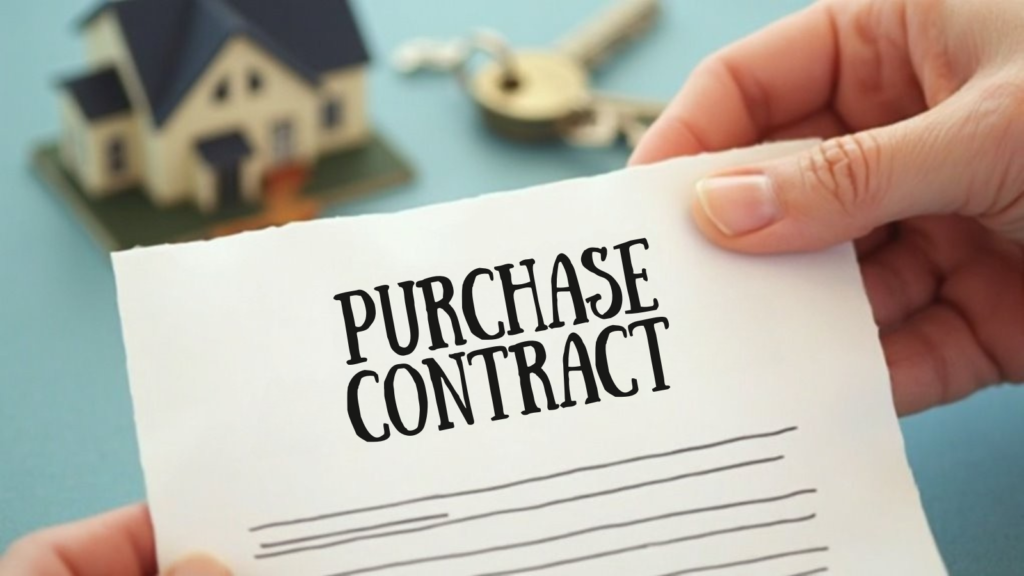To wholesale properties effectively, start by identifying motivated sellers dealing with distress situations like foreclosure. Research local laws, as states may require specific licenses. Analyze property values through Comparative Market Analysis and estimate repairs to calculate the After Repair Value for profit potential. Build a network of cash buyers using real estate meetups and online platforms. Secure property contracts, including assignment clauses, and negotiate assignment fees. Navigate legal aspects, ensuring compliance and understanding tax impacts. Strategically refine these steps to close profitable deals smoothly. There’s much more to discover about maximizing the potential of each of these strategies.
Key Takeaways
- Identify motivated sellers by targeting distressed properties or using public records for outreach.
- Conduct a Comparative Market Analysis (CMA) to determine property value and potential profit margins.
- Build a network of cash buyers through real estate meetups, online platforms, and agent collaborations.
- Secure property contracts with assignment clauses and negotiate favorable terms for assignment fees.
- Coordinate with a title company to close deals, ensuring legal compliance and proper documentation.
Understanding Real Estate Wholesaling
Real estate wholesaling offers a strategic approach to property investment without the need for substantial capital. By acting as a middleman, you can secure distressed properties under a purchase contract with motivated sellers who need to sell quickly, often due to financial distress or urgent relocation. These sellers are keen to offload their properties, providing you with an opportunity to step in and facilitate the transaction.
The essence of wholesaling lies in your ability to negotiate favorable purchase contracts. You don’t need to buy the properties outright, which eliminates the requirement for significant upfront investment or credit checks. Instead, you focus on the real estate market to identify opportunities where the property’s potential value exceeds the current asking price. Your goal is to establish a contract that allows you to assign your rights to another buyer, typically a real estate investor, for a profit.
Your income in wholesaling comes from assignment fees, which usually range from 5% to 10% of a property’s value. These fees can translate into earnings between $5,000 and $20,000 per deal, making wholesaling a lucrative venture if you can consistently find and close deals with motivated sellers.
Understanding the local real estate landscape is essential. This involves analyzing market dynamics to guarantee you’re targeting the right distressed properties and negotiating effectively. By mastering these elements, you can navigate the competitive arena of wholesaling, maximizing your potential for successful transactions while adhering to the regulations governing the real estate market.
Research Local Wholesaling Laws
Steering through the landscape of local wholesaling laws is essential, as regulations can differ widely from state to state. Diving into this complex area, you’ll find that some states mandate wholesalers to hold a real estate broker’s license, while others may have less stringent requirements. To navigate this successfully, you need a strategic approach.
First and foremost, research local wholesaling laws meticulously. Some states, like Illinois and Oklahoma, impose specific licensing requirements. This means you should consult state-specific laws to understand what’s required before you begin wholesaling properties. A misstep here could lead to substantial fines or legal repercussions.
Wholesalers often leverage the concept of selling equitable interest in contracts, which can sidestep certain licensing requirements in many jurisdictions. However, this doesn’t universally exempt you from all regulations. Confirming you’re compliant means understanding how this strategy fits within your local legal framework.
To bolster your understanding and confirm that you’re on the right side of legal compliance, consider consulting with a real estate attorney. They can provide clarity and guide you through the intricacies of local laws, helping you establish best practices for operating legally within the market.
Here’s a strategic checklist to guide your research:
- Consult State-Specific Laws: Identify what licensing requirements apply in your state.
- Understand Equitable Interest: Learn how selling equitable interest in contracts may affect your legal obligations.
- Seek Professional Guidance: Engage with a real estate attorney to clarify any legal ambiguities and confirm compliance.
Identify Motivated Sellers

To effectively identify motivated sellers, focus on those enthusiastic for quick sales, often due to financial distress or personal circumstances like divorce. Utilize strategic methods such as driving for dollars to locate distressed properties, paying attention to neglected homes or long-standing “For Sale” signs. Supplement your efforts with public records and targeted advertising to attract sellers ready to negotiate lower prices for swift transactions.
Target Quick Sale Sellers
When aiming to identify driven sellers for quick property sales, it is crucial to strategically target those facing urgent circumstances that compel them to act swiftly. These sellers often include individuals dealing with foreclosure, divorce, or sudden relocations, making them more likely to agree to a quick sale at discounted prices. To pinpoint these driven sellers, leverage public records and online databases to identify distressed properties, such as those on the market for extended periods or in pre-foreclosure status.
Consider the following strategies to effectively reach driven sellers:
- Implement direct mail campaigns: Tailor your messaging to appeal to homeowners in financial distress, highlighting the advantages of a fast cash sale.
- Engage with real estate meetups: Networking at these gatherings can connect you with individuals who have insider knowledge about potential sellers needing quick resolutions.
- Target neglected and vacant homes: Owners of these properties might be inclined to sell quickly to avoid further deterioration or financial burden.
Additionally, using social media advertising can broaden your reach, ensuring your message gets to the right audience. By strategically focusing on these methods, you can successfully connect with driven sellers and facilitate swift transactions beneficial for both parties.
Locate Distressed Properties
Although the real estate market is vast, honing in on distressed properties can give you a strategic edge in identifying motivated sellers. Start by targeting sellers facing financial difficulties, such as those in foreclosure or pre-foreclosure. These individuals are often keen to sell quickly and at a discount. Utilize online resources like Zillow and Craigslist to search for properties that have been withdrawn from the market or appear vacant and neglected. Public records are another valuable source for discovering these opportunities.
Driving for dollars is a practical approach where you physically scout neighborhoods for properties in disrepair. These run-down homes often signal motivated sellers who might be open to a quick sale. To widen your reach, consider implementing direct mail campaigns or social media advertising focused on potential sellers needing to sell urgently.
Networking with local real estate agents can also be beneficial. Attend meetups and engage in online forums to gain insights and referrals. Real estate agents often have inside information about market properties and can connect you with motivated sellers. By strategically combining these methods, you’ll increase your chances of locating distressed properties and securing profitable deals.
Analyze Property Value
Before diving into a property investment, understanding its true value is vital. To analyze property value effectively, start by conducting a Comparative Market Analysis (CMA). This involves evaluating recent property sales of similar homes in the area to establish a baseline price. By doing so, you guarantee that your investment is grounded in realistic expectations and market trends.
Next, estimate the repair costs. Assess the property’s current condition and identify any necessary updates or renovations. These costs will directly impact the overall value and should be factored into your investment strategy. Accurately estimating these expenses can prevent unexpected financial pitfalls and help you determine if the property is a viable investment.
Calculating the After Repair Value (ARV) is another significant step. This projection estimates the property’s worth after completing repairs and improvements. Typically, you’ll want to aim for a minimum profit margin of 15-20% to make sure the investment is worthwhile. Use online tools like Zillow and Redfin to gather extensive data on property sales and market trends. These platforms can provide insights into:
- Days on market for similar properties, helping identify undervalued options.
- Current pricing trends, making certain your estimates align with market realities.
- Potential for quick resale, enhancing your investment strategy.
Finally, monitor the local real estate landscape closely. Keeping an eye on market trends and pricing shifts can reveal opportunities and help refine your strategy. Understanding these dynamics guarantees you’re making informed decisions, positioning you for success in the wholesale property market. With a strategic approach, you’ll be well-equipped to capitalize on lucrative opportunities.
Make a Competitive Offer

To make a competitive offer, start by thoroughly evaluating the property’s condition and estimating repair costs to guarantee your offer accurately reflects its current state. Analyze comparable sales using a Comparative Market Analysis to determine a fair market value and position your offer within a strategic range. Factor in the seller’s motivations and apply the 70% rule to calculate a maximum offer that maintains your profit margin while appealing to the seller’s needs.
Evaluate Property Condition
Evaluating a property’s condition is an essential step in making a competitive offer. Begin by conducting a thorough inspection to assess the current state of the property under contract. Identifying necessary repairs and potential renovations is vital as these factors directly influence the property’s market value and your offer strategy. Use a Comparative Market Analysis (CMA) to understand what similar properties are selling for in the area. This helps you determine an informed and competitive purchase price.
To accurately estimate repair costs, consult with contractors or leverage online resources. This guarantees your offer considers the property’s true condition and the necessary investment required for improvements. Your goal should be to secure a profit margin of at least 15-20%, balancing the purchase price and anticipated repair expenses.
When negotiating with sellers, flexibility is key. Consider their urgency to sell and the property’s condition to finalize a purchase price that benefits both parties.
- Conduct thorough inspections to assess repair needs.
- Use CMA for understanding local market trends.
- Consult professionals for accurate repair cost estimates.
Strategically evaluating these elements positions you to make a competitive offer while safeguarding your profit margin.
Determine Offer Price
Crafting a competitive offer price often starts with a detailed understanding of the property’s current state and the necessary repairs it demands. You need to accurately assess these costs, as they greatly affect your final purchase price. Conducting a Comparative Market Analysis (CMA) is essential. This involves comparing recently sold properties in the area to establish a fair market value. The purchase price should ideally be 15-20% below the After Repair Value (ARV) to maintain a healthy profit margin.
| Factor | Consideration | Impact on Offer Price |
|---|---|---|
| Property Condition | Necessary repairs and current state | Lowers purchase price |
| Market Comparison | Comparable sales through CMA | Establishes market value |
| Seller’s Urgency | Motivation to sell quickly | Potentially lowers offer |
Consider the seller’s urgency in your strategy. Understanding their motivation can provide leverage, possibly allowing you to offer a lower purchase price while still meeting their needs. Always include contingencies in your offer. These safeguard you, allowing for renegotiation if inspection results reveal unforeseen issues during due diligence. Remember, precision in determining the offer price is key to striking the right balance between a competitive offer and ensuring a profitable outcome.
Secure a Property Contract
Securing a property contract involves several strategic steps that can greatly impact your success in wholesale real estate. First, you’ll need to identify motivated sellers, those enthusiastic to sell quickly due to financial distress or other pressing reasons. Utilize direct mail campaigns and online listings to find these sellers. Once you’ve identified potential properties, conduct thorough due diligence. This means inspecting the property and performing title searches to guarantee there are no hidden legal issues.
When you’re ready to make an offer, negotiate favorable terms in the purchase agreement. Aim for a low purchase price and include contingencies that provide an exit if necessary. It’s essential that the contract explicitly states your rights to assign it to another buyer, which is the core of wholesaling. To secure the contract, place a nominal earnest money deposit. This deposit, typically between $100 and 1% of the purchase price, shows your commitment and can be refunded under certain conditions if the deal doesn’t go through.
Once the contract is signed, start marketing the property. Utilize your network of cash buyers or real estate investors to facilitate a quick assignment. Effective marketing guarantees you can quickly move the property and achieve your wholesale goals.
- Identify motivated sellers: Use direct mail and online listings.
- Conduct due diligence: Inspect the property and perform title searches.
- Negotiate and secure: Guarantee favorable terms and state rights to assign in the contract.
Build a Cash Buyers List

To strategically build a cash buyers list, start by networking at real estate meetups where you can connect with investors enthusiastic for quick transactions. Leverage online platforms and social media groups to promote your offerings and attract cash buyers interested in distressed properties. Engage with real estate agents who can introduce you to active investors, ensuring you have a robust list of potential buyers ready to act swiftly.
Networking for Investor Connections
Building a robust cash buyers list is a strategic move that will greatly enhance your wholesale property ventures. Networking effectively with real estate investors is essential to building relationships and understanding their property deal preferences. Start by attending local real estate investment meetups. These gatherings are invaluable for connecting with potential cash buyers and learning about their investment strategies. Engaging directly with investors helps you tailor your property deals to meet their needs.
To further bolster your efforts, collaborate with real estate agents who specialize in investor transactions. They can introduce you to their buyer networks and provide referrals for cash buyers actively seeking opportunities. Additionally, participating in property auctions can be an excellent way to meet investors interested in distressed properties.
Here’s how you can strategically build your cash buyers list:
- Attend real estate investment meetups: Connect with investors and build relationships.
- Collaborate with real estate agents: Gain access to their buyer networks and receive referrals.
- Participate in property auctions: Engage directly with active cash buyers.
Leveraging Online Platforms
While maneuvering through the digital landscape, leveraging online platforms becomes a powerful strategy to build a robust cash buyers list. You can find buyers by joining real estate investment groups on social media platforms like Facebook and LinkedIn. These groups connect you with cash buyers enthusiastic for distressed properties. To keep them engaged, create a dedicated email list or newsletter that shares insights and updates about wholesale opportunities.
Online real estate forums and marketplaces such as BiggerPockets and invstg are invaluable for advertising properties and attracting active cash buyers. Additionally, CRM tools are essential for organizing and tracking interactions. They guarantee you maintain effective follow-up and build lasting relationships over time.
| Platform Type | Purpose | Tools/Examples |
|---|---|---|
| Social Media | Connect with buyers | Facebook, LinkedIn |
| Online Forums/Marketplaces | Advertise and attract buyers | BiggerPockets, invstg |
| CRM Tools | Organize and track interactions | HubSpot, Zoho CRM |
Moreover, attending virtual real estate webinars and online networking events expands your reach, allowing you to encounter a broader audience of potential buyers. Strategically using these online avenues guarantees you effectively leverage online platforms, maximizing your potential to find and engage cash buyers.
Engaging Real Estate Meetups
After effectively maneuvering online platforms, engaging in real estate meetups serves as a strategic move to further expand your cash buyers list. These gatherings are teeming with investors on the lookout for distressed properties, making them ideal for networking. By attending, you not only meet potential cash buyers but also gain insights into local market trends, allowing you to tailor your wholesale deals to satisfy demand.
To maximize your impact at these events, consider the following strategies:
- Bring Business Cards: A simple but effective tool for leaving a lasting impression. Confirm your cards highlight key information about your wholesale properties.
- Prepare a Pitch: Be ready to discuss your current and upcoming deals. A concise, compelling pitch can capture the interest of seasoned investors.
- Participate Regularly: Consistent attendance keeps you updated on market trends and strengthens your network of cash buyers.
Many meetups are free or low-cost, making them accessible even if you’re new to wholesaling. By strategically engaging with participants, you can build a diverse cash buyers list, essential for closing deals swiftly. Keep the connections alive, and they’ll guarantee a steady flow of income through successful wholesale transactions.
Market to Potential Buyers
To effectively market to potential buyers, start by crafting a strategic plan that targets the right audience. Begin by building a thorough buyers list. You can find buyers by networking with local real estate investors, attending meetups, and joining online forums. This approach helps you identify individuals interested in distressed properties, especially those who are cash buyers. A robust buyers list is vital for quick transactions and securing the best deals.
Next, focus on creating engaging marketing materials. Develop property presentations and virtual tours that highlight the property’s potential. These tools are important to attract the right buyers and demonstrate the value of the properties you have under contract. Effective marketing materials can set you apart in a competitive market.
Utilize targeted advertising campaigns on social media platforms like Facebook and Instagram. These platforms offer sophisticated targeting options, allowing you to reach cash buyers looking for investment opportunities. By honing in on this specific audience, your marketing efforts will be more efficient and effective.
Leverage online listing platforms such as Craigslist, Zillow, and local real estate investment groups to promote your available properties. These platforms can extend your reach and generate interest among potential buyers quickly. Consistent, strategic use of these platforms will help you maximize visibility.
Finally, establish relationships with local real estate agents. They can refer cash buyers and assist with marketing your properties, further enhancing your outreach efforts. By combining these strategies, you’ll be well-positioned to market effectively to potential buyers and succeed in wholesaling properties.
Assign the Purchase Contract
 When you’re ready to assign the purchase contract, start by ensuring the original agreement includes a clause that permits assignment, setting the groundwork for a smooth transfer. Strategically negotiate the assignment fee, aiming for a balance that reflects the property’s value while remaining attractive to your buyer. Pay close attention to legal considerations, ensuring all documents are in order and potential buyers are thoroughly vetted to secure a seamless transaction.
When you’re ready to assign the purchase contract, start by ensuring the original agreement includes a clause that permits assignment, setting the groundwork for a smooth transfer. Strategically negotiate the assignment fee, aiming for a balance that reflects the property’s value while remaining attractive to your buyer. Pay close attention to legal considerations, ensuring all documents are in order and potential buyers are thoroughly vetted to secure a seamless transaction.
Contract Assignment Process
Although traversing the contract assignment process may seem complex, a strategic approach guarantees a successful transaction. Start by securing a solid purchase contract with a seller, making sure it includes an assignment clause. This clause is essential, as it allows you, the wholesaler, to transfer your contractual rights to a cash buyer. Prioritize obtaining the seller’s consent since some agreements may restrict assignment without explicit approval.
Next, draft a clear assignment contract outlining the terms, including the purchase price and any contingencies. Make certain that the assignment fee is specified—typically ranging from 5% to 10% of the property’s value—paid at closing once the buyer completes the purchase. Proper documentation is vital to avoid disputes and guarantee clarity throughout the process. Retain copies of all signed contracts and disclosures, meticulously organized to maintain compliance.
Key steps include:
- Verify Seller’s Consent: Confirm that the purchase contract allows assignment and obtain any necessary approvals.
- Include an Assignment Clause: Draft contracts with clear terms for assignment, including contingencies.
- Maintain Proper Documentation: Keep thorough records of all contracts and communications to facilitate a smooth transaction.
Negotiating Assignment Fees
Successfully negotiating assignment fees requires a strategic approach that balances profitability with market competitiveness. Aim for an assignment fee that’s 5% to 10% of the property’s purchase price to maintain a competitive edge while ensuring profitability. Start by conducting a thorough market analysis to determine the property’s value and its investment potential. This data not only justifies your assignment fee but also helps you present a compelling case to the end buyer.
Transparency is vital. Clearly communicate the original purchase contract terms, as this transparency builds trust and facilitates smoother negotiations. Highlight the property’s value and potential return on investment, ensuring the end buyer understands why the proposed assignment fee aligns with current market conditions.
Consider implementing a tiered assignment fee structure. For instance, offer reduced fees for quicker sales or higher fees for buyers with substantial investment potential. This tactic incentivizes faster transactions and can make your offer more appealing.
Use comparable sales as a benchmark to support your assignment fee proposal. By demonstrating how your fee aligns with similar transactions, you strengthen your position, making negotiations more effective and ultimately more successful.
Legal Considerations Explained
Assigning a purchase contract in wholesaling demands meticulous attention to legal considerations. As a wholesaler, you transfer your rights to buy the property to another buyer through an assignment agreement. This involves an assignment fee, which is your profit, usually negotiated based on the property’s value and local market conditions. However, verify the original purchase contract permits contract assignment; some contracts might prohibit this. Confirm that there’s no clause restricting assignment, as overlooking this could lead to legal complications.
Transparency is key. You must disclose your role as a middleman to both the seller and the buyer. This adherence to legal requirements not only builds trust but also safeguards you from potential disputes. Furthermore, each state may have specific laws regarding contract assignments, so familiarize yourself with these to avoid pitfalls.
Key considerations include:
- Assignment agreement: Document the transfer of rights clearly.
- Disclosure: Maintain transparency with all parties involved.
- State-specific laws: Understand and comply with local legal requirements.
Coordinate the Closing Process
When coordinating the closing process for wholesale properties, it’s vital to strategically align each step to guarantee a seamless transaction. Start by coordinating with a reputable title company to conduct a thorough title search. This ascertains there are no liens or encumbrances on the property that could derail the closing. Addressing these issues early on prevents last-minute surprises and keeps the process on track.
Next, prepare all necessary paperwork meticulously. The assignment contract and any state-required disclosures must be precise and complete to facilitate a smooth transaction. This documentation forms the backbone of the deal and guarantees all parties are on the same page. Be proactive in confirming that the buyer has secured the necessary financing or funds. Without this step, the closing could face delays or even collapse. Verify their readiness to close on the agreed date to maintain momentum.
Scheduling a closing date that works for everyone involved is critical. Allow enough time for any inspections or contingencies that might arise, but avoid unnecessary delays that could jeopardize the deal’s success. Timing is everything in wholesale transactions, and a well-coordinated schedule reflects strategic planning.
Post-closing, verify the transfer of ownership is recorded properly. This not only finalizes the deal but also safeguards against future disputes. Maintaining good relationships with all involved parties—buyers, sellers, and title companies—lays the groundwork for future wholesaling opportunities. By executing these steps with precision, you’re setting the stage for a successful and repeatable process.
Navigate Legal and Tax Aspects

Understanding the legal and tax aspects of wholesaling is vital for guaranteeing compliance and maximizing profit margins. As you explore wholesale real estate, it’s important to grasp the importance of legal contracts and compliance issues. You’ll want to thoroughly research state-specific regulations, especially if you’re operating in states like Illinois and Oklahoma, which have strict licensing requirements for wholesaling activities.
To protect your interests and the seller’s, make sure that your legal contracts clearly define the rights to purchase. This not only safeguards against potential disputes but also strengthens your negotiation position. Consulting a real estate attorney can be invaluable to navigate these compliance issues effectively. They’ll help review contracts and confirm that all legal facets of your transactions are correctly addressed.
Moreover, understanding local zoning laws and property regulations is a strategic move. These can greatly impact your ability to market properties and complete transactions. Ignoring them could lead to setbacks, affecting your bottom line.
From a tax perspective, remember that assignment fees from wholesaling are considered taxable income. Proper accounting practices are non-negotiable; failure to report this income to the IRS can lead to penalties unless exemptions apply. Here’s a strategic checklist to guide you:
- Consult a real estate attorney: Make sure legal contracts are airtight and compliance issues are fully addressed.
- Understand property regulations: Know local zoning laws to effectively market and close deals.
- Report taxable income: Keep meticulous records of assignment fees to stay in good standing with tax authorities.
Pros and Cons of Wholesaling
While wholesaling in real estate offers a unique entry point, it’s essential to weigh its benefits and drawbacks carefully. On the plus side, wholesaling requires minimal upfront investment, making it an appealing option for beginners who might not have substantial cash or credit. You can engage with the market without the financial burden of traditional real estate investing. One of the most attractive aspects is the potential to earn assignment fees that can range from $5,000 to $20,000 per deal, with higher earnings possible on larger transactions. Additionally, wholesaling allows for quick cash generation, as deals can often close within two weeks, providing a faster turnaround compared to other real estate strategies.
However, it’s important to evaluate the cons. The income from wholesaling real estate can be unpredictable, primarily because it hinges on finding motivated sellers and successful negotiations. This uncertainty can lead to financial instability if you’re unable to consistently secure deals. Moreover, the market is competitive, and finding viable deals can be challenging. Intense competition can slow down your potential earnings, as you’ll need to sift through numerous properties and sellers to find the right opportunities. These factors contribute to the volatility in income and can make it difficult to maintain a steady cash flow.
To succeed in wholesaling, you’ll need to strategically balance these pros and cons. While the potential for quick cash generation and minimal investment is enticing, the unpredictable nature of the business and the fierce competition require careful planning and execution to mitigate financial instability.
Networking and Building Relationships

To thrive in wholesaling real estate, building a robust network of real estate investors and cash buyers is essential, as this network directly influences the speed and profitability of your property sales. Strategic networking requires a multi-faceted approach to maximize your reach and effectiveness. Start by attending local real estate meetups and networking events. These gatherings are ideal for fostering relationships with potential buyers and sellers, creating a foundation of trust and collaboration within the community. By consistently engaging with these groups, you’ll expand your list of cash buyers and increase your chances of closing deals swiftly.
In addition to face-to-face interactions, leverage online forums and social media platforms to widen your reach. LinkedIn, for example, allows you to engage with other real estate professionals, share insights, and identify potential partnerships. Active participation in these online spaces can lead to valuable connections that are difficult to make through traditional methods alone.
Furthermore, don’t underestimate the power of referrals in building your network. Consult with title companies and real estate agents to gain introductions to active investors in your area. Their recommendations can enhance your buyer network considerably, creating more opportunities for profitable deals.
Here’s a strategic recap for effective networking:
- Attend Local Meetups: Build relationships with cash buyers and investors.
- Engage Online: Use forums and social media to connect and share insights.
- Seek Referrals: Consult with industry professionals for trusted connections.
Regular communication is key. Keep your network engaged with newsletters or updates on available properties and market trends. This proactive approach not only maintains interest but also positions you as a knowledgeable resource within your network.
Continuous Strategy Refinement
As the real estate market evolves, sharpening your strategies becomes essential to maintaining a competitive edge in wholesaling. The continuous refinement of your approach is a vital wholesale real estate step that guarantees you stay ahead of the curve. Start by conducting regular Comparative Market Analyses (CMA) to keep your pricing strategies competitive and relevant. This analytical approach helps you find motivated sellers and position your offers attractively.
Next, focus on updating your cash buyers list. Networking at local real estate meetups and actively participating in online investor forums will help maintain a robust pipeline of potential buyers. This proactive measure guarantees you can quickly find a buyer when a property becomes available.
Feedback is another vital component. After each transaction, seek input from sellers and buyers to pinpoint areas for improvement. This practice helps refine your negotiation skills and enhances your overall communication, making each deal smoother than the last.
Staying informed about local regulations is non-negotiable. Wholesaling practices can vary, and adapting your strategies to comply with changing laws guarantees you avoid legal pitfalls. This strategic vigilance protects your business and reputation.
Investing in new marketing techniques is also key. Explore tools like social media advertising and virtual property tours to amplify your outreach. These tactics can help you effectively attract and engage with motivated sellers, broadening your network and opportunities.
Conclusion
So, you fancy yourself a real estate mogul, eh? Imagine this: you’re a savvy detective, hunting down motivated sellers like rare truffle pigs sniffing out hidden gems. You analyze, strategize, and navigate the legal jungle with the finesse of a tax accountant on caffeine. Sure, you’ll encounter the occasional pitfall, like a networking event with no hors d’oeuvres. But with persistence and a dash of charm, you’ll refine your strategy and conquer the wholesale kingdom.




